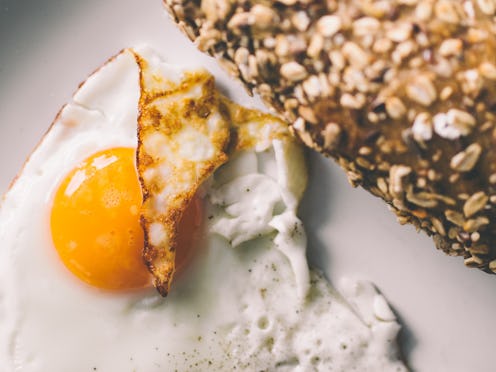Life
11 Little Nutrition Tweaks That Make The Biggest Impact

Cleaning up your diet and eating healthier is a lifestyle, one that requires making healthier choices always instead of just one time. Trying to completely overhaul your eating at once can be overwhelming and often counterproductive, which is why it can be more useful and attainable to try making little, but impactful, diet tweaks instead. You don't need to start eating only kale and quinoa for every meal, but you can start making little swaps or additions that can make a big difference in your health.
"Small changes can occur gradually over time and set us up for success better than attempting to make big changes," says Mandy Enright, MS, RDN, RYT over email. "When we attempt to make a big change (or multiple big changes at once), often we go in without a plan and can feel overwhelmed and frustrated, and we ultimately revert back to the previous behavior."
Consistency is key, but you have to start somewhere, even if it's just baby steps. If you want to get healthier without feeling like you have to change up your entire way of eating, consider these 11 diet tweaks that make the biggest impact with the least effort, according to experts.
1Drinking More Water
"Most of us do not drink enough water, and wait for the feeling of thirst before reaching for water," says Claire Martin, RD over email. Staying hydrated can help improve your mood, elevate your energy levels, and even improve your focus, according to a study from the Journal of Nutrition. "Drink water after breakfast and lunch to keep yourself feeling full between meals," she says.
2Eat A Side Salad
A goal at most meals should be to have half a plate’s worth of veggies, and if you don't have time to cook a side dish, you can just prepare a little side plate of greens. "Colorful vegetables have nutrients, antioxidants, and fiber to increase fullness, slow glucose absorption, and promote gut health," says Enright.
3Sprinkle On Seeds
"Seeds such as hemp, chia, and flax are a great way to add fiber, protein, and omega-3s to meals," says Enright. "The nutrients found in seeds will slow blood sugar absorption, control insulin production, promote gut health, and increase satiety at meals." Add them into salads, cereal, oatmeal, yogurt, toast, and even sautéed veggies
4Keep A Tin Of Nuts
"Keep an empty 'Altoids-type' tin and fill it with almonds or other nuts," says nutritionist Dr. Keith Ayoob over email. "I encourage almonds because they're super-nutritious, but they're not greasy on your hands, which means they're more subtle for eating in the office. Peanuts are also nutritious."
5Ditch The Sugary Drinks
Cutting down on sugar is one of the best changes you can make for your health, and an easy way to start is to do ditch beverages like sodas, fruit juices, and sweet tea. "The problem is, the average soda, glass of fruit juice, or glass of sweet iced tea is going to contain well over a days worth of sugar," says nutrition coach Erin Akey KNS, FNC over email.
6Add Protein To Your Breakfast
The more protein you eat in the morning, the more satisfied you'll feel and the less hungry you are throughout the day. Ayoob suggests adding foods like Greek yogurt, hard-boiled eggs, and cheese to your breakfast for additional protein.
7Use Olive Oil Instead Of Butter
Fat is back in favor again, but some fats are healthier than others, and olive oil tops that list. When cooking, consider using olive oil instead of butter (except on high heat). "Both are fats, but olive oil is an unsaturated plant-based fat, which is associated with good heart health," says Rebecca Lewis, registered dietitian at HelloFresh, over email.
8Use Greek Yogurt Instead Of Sour Cream
Whether you're making tacos or a creamy dip, swap out your sour cream for Greek yogurt. The taste is similar, but you'll get more nutrients, including protein and vitamin D, says Lewis.
9Swap Out Refined Grains For Whole Grains
Instead of white bread, eat whole grain bread. Switch out your white rice for brown rice. Go for a whole wheat pasta or quinoa pasta instead of white pasta. "In addition to all those extra nutrients, you’ll be getting your daily recommended intake of fiber, which helps to keep us full and helps curb the desire to snack," says Lewis.
10Use Herbs For Flavor
Instead of loading on the salt, experiment with herbs such as parsley, basil, thyme, oregano, etc. "These lovely fresh herbs are usually added towards the end of cooking, and can add a beautiful final touch to any dish, elevating the flavor without adding extra calories, fat, or salt," says Lewis. "They really are the magic ingredient that transforms a good dish into an extraordinary dish."
11Stay Away From Boxed Foods
Change up your grocery shopping and ditch those packaged and processed goods. "Over 80 percent of the processed food items in the grocery store contain loads of added sugar, not to mention loads of chemicals, additives, preservatives, and fake ingredients. "When you do your best to eat mostly foods that can spoil and that come from the produce department and the meat department, and especially when you add one to two additional plants to every meal, you start to see changes in your health that go far beyond weight," says Akey.